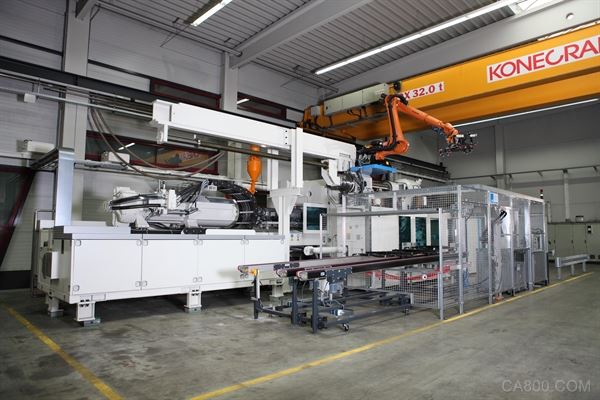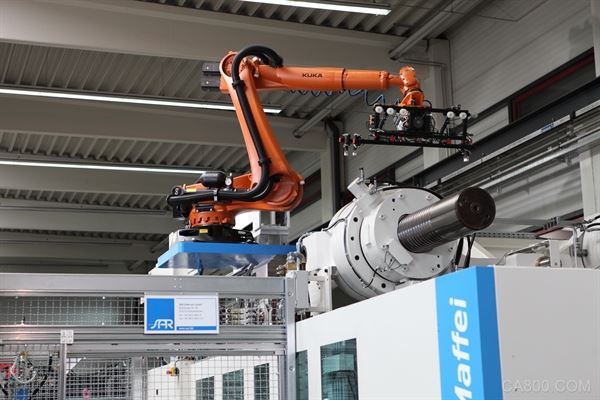With the increasingly high requirements of the plastics industry on production flexibility, product life cycle, and component complexity, how to complete the adjustment in the shortest time to meet the changing needs of the plastics manufacturing industry has become an important issue in the transformation and upgrading of the industry. . In recent years, injection molding manufacturers are accelerating the search for projects with higher levels of productivity, the lowest total project investment, and the shortest return on investment. The automated system that uses robots as an important carrier has undoubtedly become the “winning weapon†in the eyes of injection molding manufacturers.
In the past ten years, automation technology has developed rapidly worldwide. Through the application of automation technology, industrial manufacturers have effectively reduced production costs, increased productivity and production flexibility. At the same time, product quality and production safety have also been greatly improved. As one of the industries that runs through all industrial fields, with the increase of production flexibility and the complexity of the process, the application of automation technology to the plastic manufacturing industry is also rapidly changing.

Automation has become an inevitable trend in the development of the plastics industry. Therefore, choosing a powerful robot partner to successfully promote the transformation and upgrading of the plastic manufacturing industry has become the key to the development of the company. At the 2017 Chinaplas show, Thomas Magga, general manager of KraussMaffei Automation Co., Ltd. (hereinafter referred to as “Klaus Maffeiâ€), spoke of their story: “Klaus Maffei has more than 34 in automation. Years of experience: For the first time in 1995, we integrated industrial robots on injection molding machines. By 2009, KraussMaffei had accumulated a wealth of experience in the automation technology of the injection molding industry: it was time to determine our future. As an industrial robot partner, KraussMaffei investigated a lot of industrial robot manufacturers and eventually we chose KUKA."
The beginning of cooperation is often based on the brand's popularity and industry reputation, and KraussMaffei is no exception. Thomas Magak said: “KUKA has a very strong brand advantage. As two companies also from Germany, we already know about the name KUKA before entering the Chinese market. Around KUKA, around 2009 The highest industrial robot manufacturers, but their reputation in the plastics industry is very good. We were also faced with an important choice at that time, what kind of partners to choose in order to better serve customers. In the end, we chose KUKA." The successful long-term cooperation proves that the two sides made the right choice at the time.
From Thomas Magag’s narrative, we learned that 2010 was the beginning of a partnership between KraussMaffei and KUKA. In the following years, KraussMaffei took to the fast track of development and continuously introduced new solutions. It is worth mentioning that KraussMaffei and KUKA jointly participated in the development and in 2012 they jointly launched the new control unit MC 6. "This is a very unique control unit. Its greatest advantage lies in the integrated control concept," Thomas Maggare then explained. "First, the integrated control allows the injection molding machine and the robot to control each other; secondly, through MC. 6 The switch between the robot and the injection molding machine can be easily and conveniently switched off, which saves a lot of time. Finally, KraussMaffei's software package uses a user-friendly programming method to provide a more user-friendly operation interface. Therefore, MC 6 is very suitable for large-scale systems, users can use the bus mode for efficient data management, and this is what most automation companies can't do."
KraussMaffei and KUKA have extensive cooperation on a global scale. Whether in Germany or China, both sides have benefited from mutual participation and cooperation. Thomas Magag tells us that KraussMaffei has always insisted on using the same product standard on a global scale. “As a group company, China is not an independent market for KraussMaffei. In our heart, KUKA is our preferred industrial robot partner, and we have incorporated KUKA's products into the global procurement system because KUKA technicians With a high degree of professionalism, always face high efficiency and reliable solutions."
It's more than just taking parts
"The Chinese market is full of opportunities and challenges. In recent years, with the rapid growth of the automation market in China's injection molding industry, the plastics processing industry is eager to grow," said Hao Singer, president of the injection molding division of Shanghai KraussMaffei Machinery Co., Ltd., in an interview. Automated solutions that can meet more complex applications."
In many people's minds, the automation of the plastics processing industry often means adding a linear robot or industrial robot around the injection molding machine, and they are only constantly repeating the action of taking parts. In fact, the plastic processing industry for robots Use has long gone beyond this category, such as the current widespread use of in-mold labeling, complex insert applications, assembly of several multi-material products, subsequent trimming of products, and flame treatment. These applications can all be achieved through suitable automation solutions.
The collaboration between KraussMaffei and KUKA creates one outstanding automation solution. Haosingge cited a case in the scene: In an automotive dashboard production project, Rolls-Maffei used a KUKA KR 60 L30 robot. After completing the injection of the injection-molded parts, the robot can grasp the dashboard to continue cutting. Gate, flame treatment, labeling and other scans, and finally the product on the conveyor belt. “This whole set of actions, such as running through the clouds, demonstrates the leading automation level of us and KUKA in the plastics manufacturing industry. The reason why we chose KUKA robots is based on three considerations: First, this set of actions is very demanding on the repeatability of robots. High, but it is more than sufficient for KUKA robots; secondly, KraussMaffei's operating interface VisuX system can be installed in the KUKA robot, so that the system data parameters can be more easily viewed; and thirdly, using KraussMaffei's The programming helper ProgTechX, KUKA robots invoke commands directly from the command library, simplifying programming and helping customers reduce the complexity of programming operations."
The best is the best
As a basic industry that runs through the entire national economy, the plastics processing industry involves numerous downstream application industries such as automotive, packaging, medical, electrical and electronics, and construction. The demand for automation solutions for each downstream industry must be different: the automotive industry has the most extensive automation requirements; the packaging industry seeks fast automated systems with stacking capabilities and insertable tags; the medical industry needs to apply to the net Room automation program...
Through diversified market demands, we can see several commonalities: All injection molding manufacturers hope to reduce physical labor during the molding process or post-molding post-processing stage, reduce scrap rate by increasing production repetitiveness, and try to Shorten the production cycle, and these points can minimize production costs.
KraussMaffei is one of the best. Hao Singer concluded: “We mainly select automation solutions according to the project and determine the type of robot according to the customer's automation requirements. With the help of reliable partners, KraussMaffei can provide a wide range of automation solutions. KUKA attaches great importance to the development of cooperation with downstream customers, not only developing leading technologies for different plastics applications, but also accumulating a lot of advanced project experience. Through the cooperation of KraussMaffei and KUKA, users can more easily master the configuration process. This is one of the advantages that we and KUKA bring together: we can always provide our customers with the best robot and automation solutions for their applications!"

Saintish Solar inverter with MPPT ranges from 1000W to 3000W, which is a new type of multi function inverter /charger, combining functions of inverter, solar charge controller and Battery Charger to offer uninterruptible power.
The off grid solar inverters are with pure sine wave output to protect electronics and the real MPPT increases around 30% of solar panels output.
The inverter charger comes with protection of over charge/discharge, over load, short circuit, battery reverse, solar reverse, etc.
PV Inverter, Solar MPPT Inverter, MPPT Solar Off Grid Inverter
Hangzhou Saintish Technology Co.,Ltd. , https://www.saintishtech.com